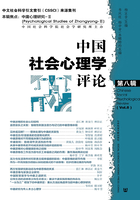
Forest before Trees When Needed:Global Processing and Zhongyong
Huang Chinlan Chung Yuchun Division of Humanities and Social Sciences, Taiwan University of Science and Technology
Lin Yicheng Department of Psychology, Taiwan University
Abstract: Pursuing harmony between one's mind and the world is the main essence of zhongyong. Nonetheless, being able to see both sides is a prerequisite to reach the best balancing. Thus, we hypothesize that global processing, i. e.,stepping backward to see the whole picture, is one of the major characteristics of zhongyong thinking mode. Furthermore, since the equilibrium state while no stirring occurs gives the best potential when situations call for precise reactions, we also hypothesize that global processing is activated when emotions are primed, and there is no preference of any attentional direction when emotional priming is absent.
In this current study, global precedence phenomenon(Navon, 1977)was used to index global thinking at the attention level. Results confirmed our hypotheses that when primed with emotional words, participants high in zhongyong tendency showed significantly more global precedence than the low and middle zhongyong groups. Moreover, when priming was absent, there was no reliable relationship between zhongyong and global processing speed.
“Detour to arrive”has recently been studied from the psychological distance perspective(Forster &Friedman, 2013). They argued that global processing as in the act of stepping backward gives more potential to the approaching motivation especially when obstacles were presented. This theory coincides with our view of zhongyong and the implications were also discussed.
Keywords: Zhongyong Thinking Mode, Global Precedence, Emotion, Detour to Arrive